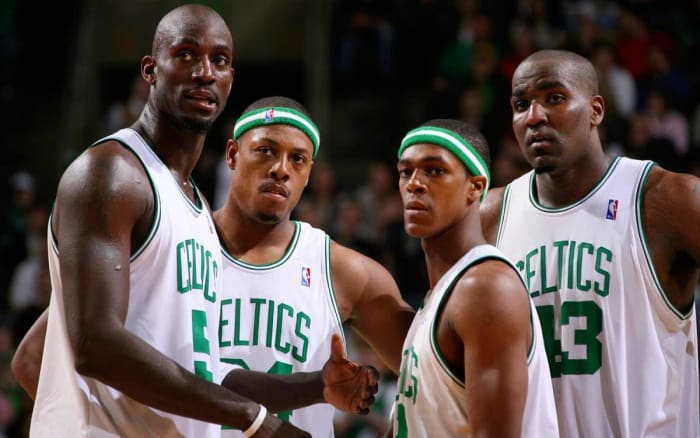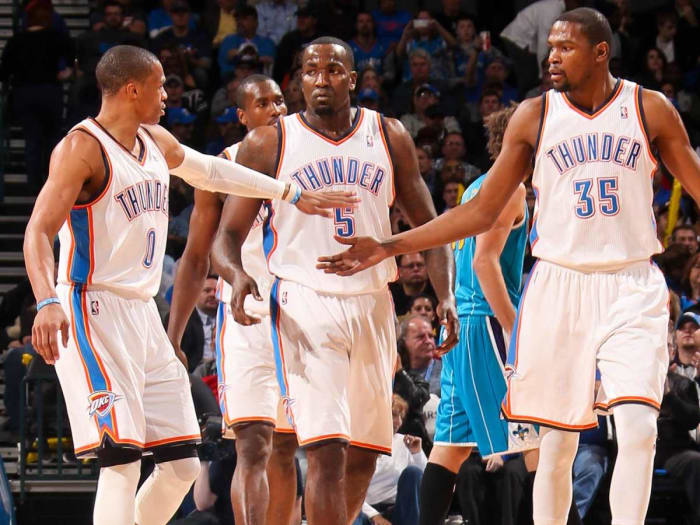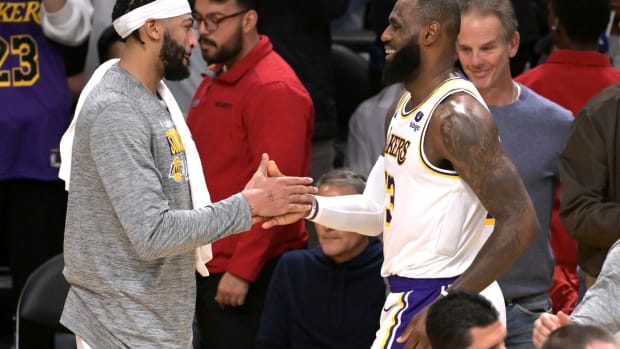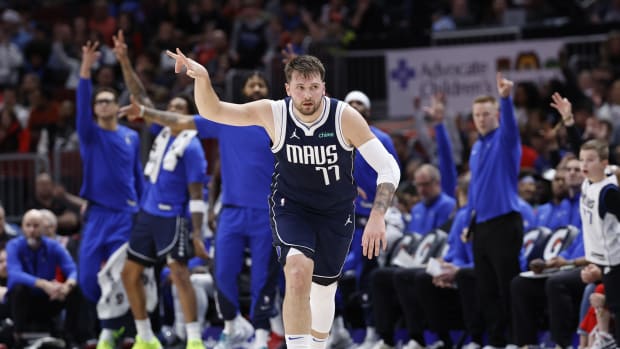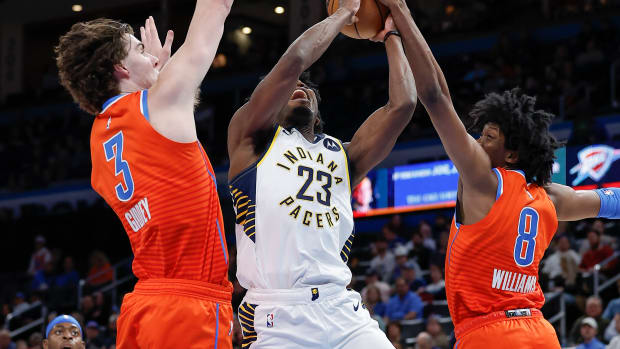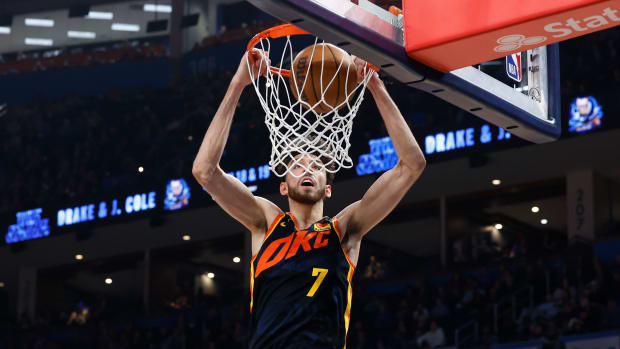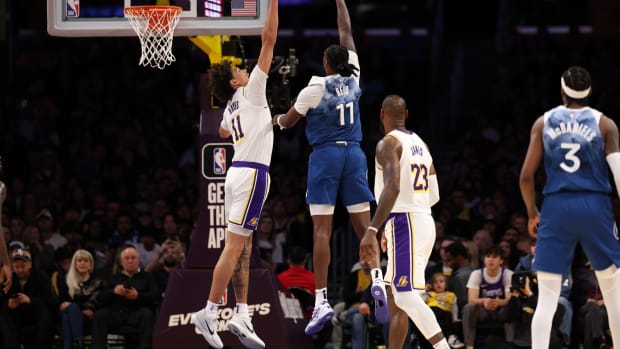Oral History: Kendrick Perkins, the NBA's Best Teammate
Kevin Durant shuffles behind the glass podium, peering across two rows of his 2013-14 Oklahoma City Thunder teammates. He thanks Hasheem Thabeet for his comic relief. He praises Derek Fisher for his infectious professionalism. “Perk,” Durant continues, eying starting center Kendrick Perkins. “I hated you before you got here. But the moment you got here, man, you just changed my whole perception of you. Just one of the best teammates I’ve ever had, man. I thank you so much.”
Durant’s voice begins to waver now. Emotion bubbles in his throat. “The late night calls. You texting me, telling me I’m the MVP.” Durant abruptly stops. He bows his head as the crowd erupts in applause. The NBA’s Most Valuable Player even has to remove his glasses to wipe the tears from his lashes.
It was a small sequence in an unforgettably heartfelt, 20-plus minute acceptance speech from Durant, yet a highly regular sentiment owned by countless players across the NBA. Perkins, a lumbering defensive presence with pedestrian career averages of 5.4 points, 5.8 rebounds and 1.2 blocks per game, is widely considered the greatest teammate in modern NBA history. “He’s the type of guy that’s willing to do whatever it takes to help your teammates,” Russell Westbrook told The Crossover. “The thing that we all love about Perk,” adds Wizards coach Scott Brooks, “is that he cares. He has a big heart and he’s only about winning.”
Perkins established a group text message with Durant and Westbrook upon arriving in Oklahoma City. “I didn’t know KD and Russ from a can of paint,” he says. “I just wanted to get it like how we had it in Boston.” They pinged the thread day and night, dishing football smack and NBA rumors. “We’re in it a lot,” Westbrook said back in April 2016, even after Perkins left the Thunder. “That’s the type of relationship we have [with him].” The group message has been silent following Durant’s departure to Oakland last summer. Perkins thinks it will resume activity in the future. “At least they’re talking to each other again,” he said. “I know they had talked right after they announced Russ won MVP. They texted. I think they broke the ice.”
Perkins’s influence followed Durant to Golden State. LeBron James and the Cavaliers still hear his voice emanating in Cleveland’s training camp. He has deep connections with Doc Rivers and the Clippers, Tom Thibodeau and the Timberwolves, Scott Brooks and the Wizards, and Alvin Gentry, Anthony Davis and Rajon Rondo in New Orleans. His leadership style will empower Westbrook to coexist with Paul George and Carmelo Anthony. His former teammate Kyrie Irving will look to rule his former home in Boston. So how exactly did a shy child from Beaumont, Texas, establish an enduring legacy amongst the NBA’s elite?
(The following interviews have been lightly edited for clarity).
'He Was a Quiet Kid'
The town of Beaumont sits 90 minutes east of Houston. Hal Pastner and his son, current Georgia Tech head coach, Josh, launched Perkins’s career in their legendary Houston Hoops AAU program, responsible for grooming the likes of Emeka Okafor, Rashard Lewis, Stephen Jackson, T.J. Ford and many others.
HAL PASTNER: We just took to Kendrick. He was a quiet kid, really quiet. Kendrick would stay at our house in the summers. He was afraid to go upstairs because it was dark.
JOSH PASTNER: [Kendrick] always had long arms and was kinda gangly. It didn’t matter if you were up 20, down 20, he had that death stare toward you. He was like one of those secret service agents.
HAL PASTNER: Right around around the same time we found Kendrick, Ndudi Ebi started with us, and over the summer they both shot up nearly a foot. They were about about 6’7” and lanky. I remember we played LeBron James in eighth grade and we beat ‘em, and LeBron came up to us after the game and said, “Man, we couldn’t stop the twin towers.”
After starring at Lamar University, Kenneth Perkins left his wife and 18-month-old son, Kendrick, to play professionally in New Zealand. When Kendrick was 5 years old, his mother was shot dead while working at a beauty salon. Essentially orphaned, Perkins’s maternal grandparents claimed his custody. His basketball family also reared him.
HAL PASTNER: Coach Boutte really started looking after him later on.
ANDRE BOUTTE, OZEN HIGH SCHOOL HEAD COACH: He needed that father figure at the time. We went fishing every now and then together at Sabine Lake, just talked day-to-day like you would with a son. Any time a kid is that age and went through some of the things he did, the most important thing is try to put a smile on their face.
From 1999 to 2003, Perkins led Ozen High to four district championships and one state title. Behind his 27.5 points, 16.4 rebounds and 7.8 blocked shots per game as a senior, Ozen compiled a 33-1 record, only losing in the state 4A championship game.
MIKE KUNSTADT, TEXAS HOOPS MAGAZINE: He just used his body so well to get around the basket. And once he was there, he just overpowered you. He didn’t have explosiveness as far as blocking shots, but long arms and good timing and was a great rim protector.
BOUTTE: [Then-Celtics GM] Chris Wallace came to a game. [Spurs GM] R.C. Buford was at one of our games. He signed with Memphis early. He was gonna go play for [John] Calipari, because I wanted him to play for an NBA–type coach that would work him real hard. It wasn’t until he actually declared [for the NBA draft] that you had a little contact to see where he was gonna be slotted. We were pretty confident he would go first round.
Early Year Enforcer
The Celtics acquired Kendrick Perkins, the No. 27 pick in the 2003 NBA draft, from the Grizzlies in a draft-night trade, fully prepared for the colossal 18-year-old to essentially redshirt his rookie season.
BOUTTE: It was like the world being lifted off of his shoulders. But any time you have a high school kid, you’re concerned about whether or not they’re gonna be able to take the day-to-day rigors of NBA life.
DANNY AINGE, CELTICS GM: When he came in for his draft workout, he was well over 300 pounds, over 22% body fat, a 22-inch vertical only. He was overweight. He needed a lot of work on his body.
JAMIE YOUNG, CELTICS ASSISTANT COACH: The first thing Perk really started doing was working his body into shape.
PERKINS: It was hard. I didn’t get a chance to play much. They basically sat me out a whole year just to work on my body. It was a different experience for sure, but it was something I needed to do to get my career going.
AINGE: He sort of went from being a fat kid to being cut. My office looks right down into the weight room, and I remember Kendrick—I could see him, he didn’t see me—I could see him looking at himself in the mirror with his shirt off. It was funny, it was cute, but it was symbolic of just how hard he had worked and how gratifying it was for him to see the results.
MIKE JAMES, CELTICS GUARD (2003-04): He was quiet because he was listening. He was learning, soaking everything in. He was paying his dues, paying his respects, being a rookie.
PAUL PIERCE, CELTICS FORWARD (1998-2013): He was my little young rookie. A lot of times, veterans rub off on them.
WALTER MCCARTY, CELTICS FORWARD (1997-05): Him and Brandon Hunter, me being one of the veterans, I was switching out TVs in my house, I had about four or five of the old TVs and I had the rookies come over: Take the new one’s up, bring the old ones down, and had ‘em working for me out there at the house. It was pretty funny to see these young kids running in an out, big strong young guys and just putting them to work.
A young Perkins worked his hardest during practice the following season. When the Celtics drafted the 6’10" Al Jefferson at No. 15 in the 2004 NBA draft, Boston not only added a promising frontcourt talent, but a sparring partner for Big Perk.
MCCARTY: They used to go at it. Perk went at it with everybody.
DOC RIVERS, CELTICS HEAD COACH (2004-13): They played tons of 1-on-1. There were many times where you actually contemplated stopping it because you’re like, “One of these guys is gonna get hurt.” That’s how physical it was.
CLIFFORD RAY, CELTICS ASSISTANT COACH (2005-10): They really had some good battles. I thought Al made Perk better, because he was such a prolific scorer. We used to call him Buckets. He used to say, ‘Yea, coach. I just get buckets!’ Al Jefferson has tremendous ability. He had a God given gift. Perk was the opposite. He was a true center. When I look at Perk, he was always our best defender. If someone was going to come down the middle, he would be there. He knew when to go for the shot block and when to take the charge.
RIVERS: Perk and Al were just trying to find themselves. Al was the offensive guy. I think that actually helped Perk a lot. It helped him define a role early in his career.
YOUNG: His role was more of an enforcer.
The Celtics were still rebuilding around Pierce during the 2006-07 season, but began to play with the edge of a playoff contender. When Boston visited the Minnesota Timberwolves on Feb. 11 that winter, Perkins displayed his burgeoning reputation as a defensive anchor.
TOM THIBODEAU, CELTICS ASSISTANT COACH (2007-10): Perk really starred in his role and his role really was to do a lot of the dirty work.
JAMES: He was always throwing his lip up and frowning. He was angry.
GERALD GREEN, CELTICS GUARD (2005-07): He was the enforcer, so sometimes he might have to make a hard foul.
YOUNG: I remember playing Minnesota and I remember Perk talking a lot of trash to [Kevin Garnett].
JAMES: Kendrick’s not gonna back down from no one. He’s not a punk.
RIVERS: The thing I liked about Perk was he didn’t care that you were KG or Kobe or Michael or whoever it was. He was convinced that you couldn’t score on him. He always made the comment, “You may be great, but not tonight.” I used to love it. I thought it really irritated star players.
KEVIN GARNETT, MINNESOTA TIMBERWOLVES FORWARD (1995-2007): We had obviously clashed and had numerous occasions where we banged a little bit. When you’re older and the big dog, you got little pups and stuff wanting to come at you night in and night out. It always got me going. It always motivated me.
PIERCE: They almost got into a fight.
YOUNG: I don’t remember exactly what happened postgame, but there was a little—there wasn't any physical altercation—but there was some verbal altercation between the two.
Big Three Era
Perkins’s barking still rang in Garnett’s ears when Minnesota and Boston discussed a blockbuster trade on draft night that June. The Celtics remained firm: Boston would only exchange Jefferson and a horde of other assets if Garnett agreed to a contract extension. Talks regained steam in July, with Boston having already acquired sharpshooting, All-Star guard Ray Allen from the Seattle SuperSonics. This time, before ultimately signing, Garnett phoned Pierce.
PIERCE: Kevin was like, “What’s up with Perk? Is he gonna want to fight me when I come to the team?”
GARNETT, CELTICS FORWARD (2007-13): I asked Paul, not really concerned but I just wanted to come into it, handle whatever we needed to handle.
PIERCE: I was like, “Man, you don’t even know how much he look up to you.” Kevin couldn’t believe it.
GARNETT: We sat and we talked. The first day I got there, we were like best friends. Once we got on the same page, man, we were off and running. I’m not gonna take anybody that doesn’t want to work. I don’t like people who complained. I don’t like people who don’t have a work ethic. I don’t do quitters. I wanted to see how he worked on his own. Perk was just similar to me. We were grinders, kind of physical specimens.
PIERCE: It was like seeing a big brother look out for his little brother—take him out to the backyard, let’s go play catch—it looked like that.
RAY ALLEN, CELTICS (2007-12): When we got there, KG, it really gave him somebody that he can see and kind of look up to. When he got to see KG work, he had somebody that was always going to communicate with him, somebody that was always gonna have his back. He started emulating what KG was.
PIERCE: Kevin inspired a lot of the kids in the league that came out of high school.
AINGE: I think they had a mutual admiration for each other, because both of those guys were 100% team guys and both of those guys were hard-working, tough-minded. That’s why they hit it off so quick. It’s tough to win KG over. I don’t think it took Perk very long at all before he had KG’s respect.
RIVERS: I do remember the first practice. The trash talking. It was really the second unit vs. the first unit. It was distracting. It was literally 30 minutes into the first practice that we ever had and Eddie House and James Posey and that group decided that they weren’t going to take any crap from the first unit.
JAMES POSEY, CELTICS FORWARD (2007-08): It was intense, being that was the first start of our journey, having a chance and thinking we could win it all.
RIVERS: I had to blow the whistle two or three times and just tell ‘em, “Either you can play, or you can talk. The first group is able to do both. But the guys that can’t, shut up!”
ALLEN: We were a bunch of A-type personality guys.
GARNETT: We got into arguments, we got into fights, we wrestled. We were a team full of barbarians. We were like 300. It was us against the world, straight out. If you ask anybody from that team, we felt like we were straight up warriors and straight up Greek gods and goddesses and all this other shit.
MIKE ZARREN, CELTICS ASSISTANT GM: That group just worked great together. Everybody understood what their role was. Kevin preferred to play 4, rather than 5. He loved to have Perk around to take the brunt of the banging with other big buys. Perk was happy to do that as well.
GARNETT: We were responsible for talking, if not calling out defenses as far as strategies, coverages and stuff like that. Doc put that responsibility on us. We were both decent passers. Him and I, we gelled quicker on the court, as far as basketball, more than anybody else.
PERKINS: When [KG] first got [to Boston]: “Hey listen, me and you, we gonna anchor the defense, we’re gonna set screens and get Paul and Ray open, and when I hit you with the pass, make sure you be ready to finish.”
MIKE GORMAN, CSNNE CELTICS PLAY-BY-PLAY: I always thought that a lot of KG’s bravado was backed up by the fact that, if you looked immediately over his right-hand shoulder, Perk was standing there. I always thought Perk was kind of the man behind the myth there. He had a cop standing right behind him to take care of business if things didn’t work out.
THIBODEAU: He was obviously a big part of the championship team. A very hard guy to score against and offensively, probably didn’t get enough credit for setting great screens and being real active.
Boston indeed claimed the 2008 title that June, in six games over the Los Angeles Lakers. As the Celtics contended for the championship over the next three years, Perkins emerged from Garnett’s tutelage as the consummate professional.
PIERCE: He’ll sacrifice anything for his teammates. He’ll give you the last chair at breakfast, he’ll make sure the younger guys are alright. To earn respect, you have to give respect, and that’s what Perkins is.
GARNETT: If you know anything about his upbringing, he had a pretty tough upbringing, lost his moms. He became a breadwinner in the house very early, learned a lot of different things from different people.
PERKINS: Your upbringing plays a major part in how you act as a person. I’m just a guy where, if I’m with you, I’m all the way with you. They’re ain’t no half and half. If I’m with you, I’ma ride with you til the end.
GREEN: Sometimes Perk was the incredible Hulk, sometimes he was the teddy bear. Perk bought me so much stuff, man. My rookie year he took me shopping. We went to L.A. and there was a guy named Faruk. He used to always have jeans and stuff. Perk bought me, like, four or five outfits.
MARQUIS DANIELS, CELTICS GUARD (2009-12): There were other guys that didn’t have their car in town yet and he’s like, “Here you can borrow my car. You can come to my house and eat.” Or he’d take them out to eat.
BILL WALKER, CELTICS FORWARD (2008-10): He would always call me when we were on the road to hang out with him. We'd go for food and he would just tell me stories about how to prepare and how to work. He always was encouraging and always willing to help me break down things on film to get better.
BRIAN SCALABRINE, CELTICS FORWARD (2006-10): He still remembers my kids' names and I haven’t played with Perk in over six years and, at the time, my kids were 2 and just a newborn.
After falling short in 2009, the Celtics returned to the Finals in 2010. Boston carried a 3-2 lead back to Los Angeles for Games 6 and 7 against the Lakers. Just under seven minutes into Game 6, Perkins crashed to the floor after battling for a rebound.
TONY ALLEN, CELTICS GUARD (2004-10): [Perk] was one of the best centers in the league before his injury.
ZARREN: The moment it happened on the court, his knee didn’t move in a way that was awful. You see some nasty knee injuries, that wasn’t one, in terms of how it looked live or watching replays.
ALLEN: I was scared for him, for his health and safety. And then I was scared for our ability to win an NBA championship after that because I thought, “How could we win it without him?”
AINGE: It was tough to see him go down.
ZARREN: He came back to the locker room and by the time we got down there it was pretty clear it was a significant knee injury. Everyone was just crying in the locker room.
RIVERS: For me, it more was emotional that Perk wouldn’t have the chance to play in that Game 7.
ZARREN: We had played pretty well with Rasheed [Wallace] playing that year.
RAY ALLEN: We just had to try and steal one more game.
RIVERS: It actually showed the value of Perk quite a bit. It took away our enforcer. Kevin had to spend half the game trying to be that and play and I thought that took a lot out of him.
DANIELS: I think he made a huge difference between us having a ring that year and not getting one.
PERKINS: Defense wasn’t the problem, it was who wanted it the most. And I actually think they went and took it from us.
ZARREN: There’s a certain swagger about Perk that he brought to that team. Who knows how the next game would have gone if Perk had played? The losing still hurts so bad. None of us, I’m sure Perk included, will ever get over that game.
Testing proved Perkins tore his right ACL, forcing him to rehab for the majority of the following season. After Perkins played just 12 games for the Celtics in 2011, Boston re-evaluated the future of their frontcourt and set its sights on Oklahoma City swingman Jeff Green, ultimately dealing Perkins for him at the trade deadline.
PERKINS: I cried.
AINGE: It was very difficult. I loved him. We sort of raised him. We just knew that he was going to be very expensive. He became so expensive to Oklahoma City that they had to move [James] Harden.
ZARREN: There wasn’t a dry eye in the room when we agreed to that trade.
RIVERS: I would say in the years that I’ve coached, it was the hardest trade for me. It was the hardest reaction that I’ve ever seen in a locker room as a coach. There were literally tears in the locker room. It was almost like a death.
ALLEN: I was hurting for him, because I knew where his heart was. I knew he had only played for one team his whole career. He wanted what everybody else wanted. He wanted to be compensated, he wanted to make enough money so he could take care of his family.
DANIELS: It’s like, “Man, we lost a key component to our team. He’s like a brother.”
RIVERS: That starting lineup, [when healthy] has never lost a playoff series.
GARNETT: I wish Danny Ainge would have paid attention to that.
Thunder Buddies
Perkins inked a four-year, $36 million contract extension with the Thunder that March. With OKC fresh off its first playoff appearance in 2010, Perkins’s arrival perfectly preceded a deep playoff run. The Thunder reached the conference finals in 2011 and the Finals in 2012. OKC never missed the postseason during Perkins’s tenure.
BOUTTE: He was hurt when he first went to Oklahoma, but him being such a good teammate, he was the perfect person for the organization at the time.
PERKINS: I watched how [Garnett] worked, I watched how he operated, I watched his leadership skills and I just took it all in and brought it to my next stop.
PIERCE: That’s the reason you saw Perkins wore No. 5 [Garnett’s number in Boston] when he went to Oklahoma City.
NICK COLLISON, THUNDER FORWARD: We were starting to play in playoff series. A lot of us hadn’t had much experience there, so I think he was great for us at that time. He really deserves a lot of credit for the success we’ve had over the years.
PERKINS: Our first shootaround, I came in and [Durant and Westbrook] was laughing and joking and I was like, “Ay man, listen up. Lock in.” I remember them kind of barking back and got into an argument. But we ain’t have no problems ever since.
RUSSELL WESTBROOK, THUNDER GUARD: He didn’t hold nothing back. If he saw something that would help our team, he’d let you know.
RONNIE BREWER, THUNDER GUARD (2012-13): The mentality our Thunder team had, you’re not going to push us around, he did that.
ANTHONY MORROW, THUNDER GUARD (2014-17): He knew how to connect with different guys in just a couple words to light a fire under him and get him going. It was definitely unique to see that.
ANDRE ROBERSON, THUNDER GUARD: His house was always open.
WESTBROOK: People would come by, just chill, enjoy each other’s company, maybe watch a game or some boxing, whatever was on TV that day.
REGGIE JACKSON, THUNDER GUARD (2011-15): I had times where Perk showed up to my house just because he could tell I had a bad week. It was perfect timing, it was the right words, it just kept me chugging along.
COLLISON: The big thing with him is that he always had a good feel on where collectively the morale was.
CARON BUTLER, THUNDER FORWARD (2014): Late night, he’d send texts like after a tough loss. He couldn’t sleep. He’d text you at two, three in the morning. “How you doing? Damn, man. What you see out there?”
THABO SEFOLOSHA, THUNDER FORWARD (2008-14): It was always about how we can improve, things we can do better, things that we did well that night, keeping it up.
WESTBROOK: If I had a bad game, he’d call. If I had a good game, he’d call. I know if I needed to call somebody at 3, 4 in the morning, he’s always gonna be up to answer the phone regardless of what’s going on. That’s what makes him special. It’s not just one time, it’s not once a week, it’s all the time.
GARNETT: I taught him how to communicate.
PERKINS: Everybody who has my phone, they can call me anytime. If I’m up, I’ll answer it. There was a time, KD was struggling mentally and he just called me. Russell went down. Even before he started getting into the chatter about the MVP conversation. I was telling him, ‘Hey man, you’re the MVP. You can do this.”
SERGE IBAKA, THUNDER FORWARD (2009-16): On the bench, off the bench, he’s going to talk. He loves to talk, use his voice, to get your confidence up when your confidence is down.
STEVEN ADAMS, THUNDER CENTER: He did give me some advice, but it seems a bit brutish: “Go out and make sure you hit this guy.”
JACKSON: Everybody always sees the persona of him, just this mean guy on the court, but off of the court he’s this big teddy bear.
DEANDRE LIGGINS, THUNDER GUARD (2012-13): When I got to OKC, I went to the store for him. He gave me this big lump sum for no reason. Like, “Go to Starbucks for me and get some coffee,” and he gave me like $1,000 and told me to keep the change.
BUTLER: He was always honest in film. [In the 2014 playoffs, down 2-1 to Memphis], we ended up winning that and going to the Western Conference finals just because of the conversation that he led in [a] film session.
PERKINS: I told KD he was the best player in the league and he needed to act like it.
SEFOLOSHA: It was real intense. Our backs were against the wall and he knew what we needed to do. The message got through to everybody.
WESTBROOK: He wanted to have a man-to-man type of speech, and I think that was something we needed as a group and our entire defense to buckle down.
ADAMS: That’s why people like him and that’s why a lot of teams want him around. Nobody gets away with anything, he makes sure you’re honest and do whatever your job is.
The Last Chapter
As the 2014-15 season approached its midway point, Oklahoma City GM Sam Presti schemed to surround Durant and Westbrook with younger, more malleable frontcourt talent. The Thunder bid Perkins farewell in exchange for Utah forward Enes Kanter in a three-team trade. The Jazz ultimately waived Perkins, opening the door for another shot at a title.
THIBODEAU, CHICAGO BULLS HEAD COACH (2010-2015): I talked to him about coming to Chicago.
RIVERS: There is no better guy to have on your team to help facilitate roles to the other teammates than Perk.
PERKINS: I felt like Cleveland was the best in the East and they would have the easiest walk to the Finals. That’s what made me choose. It was hard turning down Doc and Thibs, but I had to.
DAVID BLATT, CAVALIERS HEAD COACH (2014-16): Getting Perk at the time frame that we did was great for us. We had a good locker room, but Perk is another strong voice and experienced leader.
POSEY, CAVALIERS ASSISTANT COACH: A couple times, he got the guys together from afar, like, “Yo, this some bullshit. We out there bullshitting around, we fucking around. We got a good opportunity. Pick this shit up.” He looked at people in the face. Pointing ‘em out. “Come on! What you gonna do? What we gonna do?” Everybody, they got the point, they got the message.
PERKINS: They was looking at me like, “What the fuck?” I was just letting them know I was all in.
J.R. SMITH, CAVALIERS GUARD: Right around 78, 79 games, something like that, he was telling everybody, “This is a tough ride, we about to buckle down.”
IMAN SHUMPERT, CAVALIERS GUARD: Perk is unbelievable with keeping his mind set on what the bigger picture is.
JAMES JONES, CAVALIERS GUARD (2014-17): He’s really all about business when it’s time for business. He doesn’t hold back. If it’s LeBron, if it’s a rookie, if it’s a coach, if it’s the GM, he’ll point ‘em out if it’s not the right thing. He just holds everyone accountable regardless of position or status.
PERKINS: Bron, he took a backseat and let me be a leader. He was letting me talk a lot—pregame speeches—and they gave me a voice right off the bat.
MIKE MILLER, CAVALIERS GUARD (2014-15): He is to me, one of my favorite teammates I’ve ever had and I only had him for half a year.
Perkins departed Cleveland after its championship loss to Golden State for the New Orleans Pelicans and a chance to mentor Anthony Davis in 2015-16.
DANTE CUNNINGHAM, PELICANS FORWARD: He would’ve been a [veteran] that I wanted to have coming in. Just his knowledge of the game, his knowledge off the court, just how personable he is, just making sure that you’re doing well not only as a player but as a person.
ALVIN GENTRY, PELICANS HEAD COACH: The great thing about it was that Anthony has a lot of respect for him. It wasn’t unlike Perk to challenge him in a lot of situations and have Anthony respond to it. It was a good relationship. They did everything together. They spent a lot of time talking, even during the games, Perk was pulling him to the side and saying certain things to him.
PERKINS: I got a chance to play with a lot of future Hall of Famers and I don’t take that for granted one day.
At 32 years old, Perkins texted Cavs head coach Tyronn Lue to rejoin Cleveland for training camp after sitting out the 2016-17 campaign. He'd been training three times a day back in Houston. The Cavs didn’t hesitate welcoming him back into their locker room. Perkins seems like a natural fit on a team full of veterans, focused solely on a championship. Although a roster crunch could ultimately end his career, many expect Perkins to have a long tenure coaching in the NBA. Regardless of his future, he’s left a lasting imprint on the league.
PERKINS: I’d love to coach when I finish playing one day. I know a lot of GMs that value my knowledge of the game. I would have a lot of options. I probably would call up Oklahoma City.
PIERCE: Perk is probably one of the last of the old school vets that learned from the older guys in the way of giving back to the young guys. That’s just the type of person he is. You see that big scowl on his face, he look all mean on the court, but off the court, all his teammates love him.
GARNETT: I love him. That’s my real life brother, man. We have a super strong connection. That bond will never be broken and I’d do anything for ‘em.
WESTBROOK: He’s one of the most unselfish guys I know, just willing to sacrifice to help other people out.
RIVERS: He’s a sunshine guy. There’s guys who bring sunshine. He’s one of those guys.
































